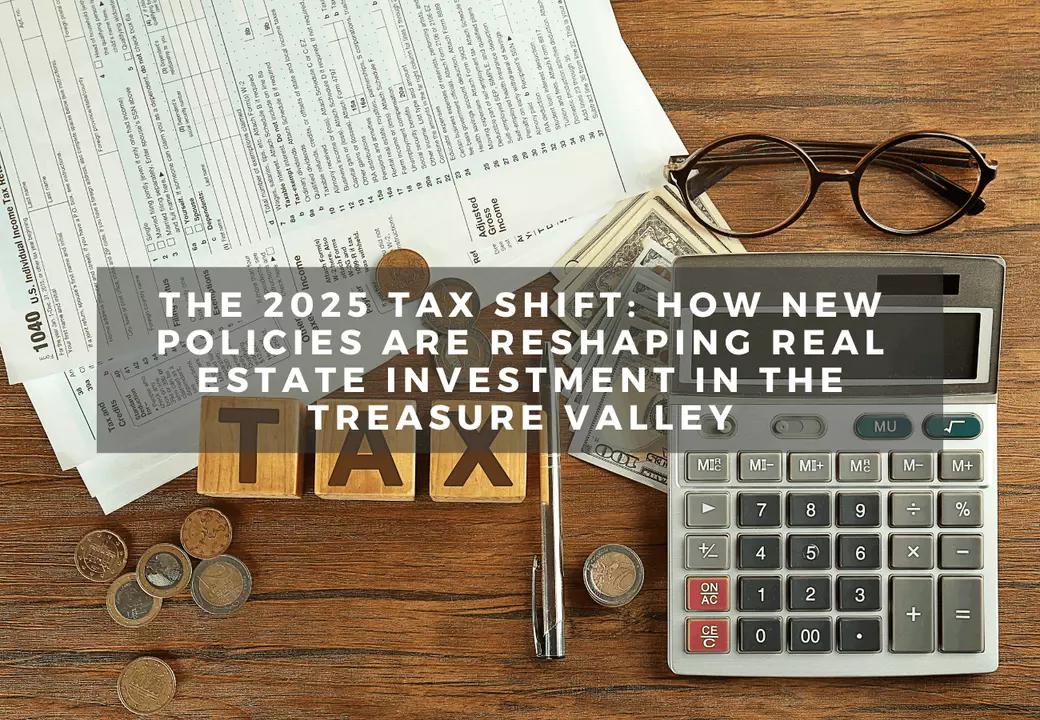The 2025 Tax Shift: How New Policies Are Reshaping Real Estate Investment in the Treasure Valley

Introduction: Why Every Idaho Investor Needs to Understand the 2025 Tax Changes
Whether you're flipping your first property, holding onto a duplex in Nampa, or cash-flowing a short-term rental in Boise, tax policy affects every decision you make in real estate.
In 2025, changes to capital gains exemptions, 1031 exchange regulations, and federal housing incentives have real consequences for investors across the Treasure Valley. And if you're not paying attention, you could leave tens of thousands of dollars on the table—or miss a golden opportunity.
Let’s break down what’s changed, what’s at risk, and how you can pivot your strategy to protect your profit, grow your portfolio, and make smarter moves in Idaho real estate.
The 2025 Tax Policy Landscape: What’s Changing?
1. Capital Gains Exclusion Adjustments
Previously, married couples could exclude up to $500,000 in capital gains on the sale of a primary residence if they lived in the home for two of the last five years. In 2025:
-
The exclusion amount is indexed to inflation, reducing predictability
-
Shorter hold periods are under greater IRS scrutiny
-
Flippers claiming primary residence status could trigger audits
Curtis’ Take: For long-term homeowners in Boise or Eagle sitting on equity, this is still a huge tool. But don’t assume your gain is automatically tax-free. We’re coaching sellers through their timelines more carefully than ever.
2. Tighter 1031 Exchange Limitations
The 2025 budget revisions introduce:
-
A proposed $500,000 cap per taxpayer, per year on 1031 tax-deferred gains
-
Increased documentation for like-kind exchanges
-
Greater scrutiny on delayed exchanges and related-party transactions
Why It Matters:
Many investors in Caldwell, Nampa, and Star have used 1031s to scale from single-family into multi-family. If this cap is passed (it’s still in debate), it’ll limit the velocity of portfolio growth through deferred gains.
Action Item: Consider reverse exchanges or cost segregation studies as alternative strategies. Talk to a 1031-qualified intermediary early.
3. Depreciation and Bonus Depreciation Changes
The 100% bonus depreciation provision from the Tax Cuts and Jobs Act is phasing out in 2025, dropping to 40%. This means:
-
Investors purchasing new construction or heavily renovating older properties won’t see the same upfront write-offs
-
The incentive to front-load capital improvements is shrinking
Curtis’ Take: This hits mid-term rental owners and BRRRR investors hardest. But there's still opportunity to optimize tax efficiency through accelerated depreciation and repairs vs. improvements classification.
Housing Affordability Credits: Opportunities in Qualified Zones
While some benefits are tightening, 2025 also brings new tax credits for developers and landlords who contribute to housing affordability.
Programs to Watch:
-
Middle-Income Housing Tax Credit (MIHTC): Provides incentives for creating workforce housing
-
Section 45L Energy Efficient Home Credit: $2,500–$5,000 per qualifying unit
-
Opportunity Zone Incentives: Still valid in zones across Caldwell, parts of Nampa, and West Boise
Curtis’ Tip: Builders and buy-and-hold investors should analyze build-to-rent models in opportunity zones—especially in west Nampa and east Caldwell where zoning supports density.
Strategic Impacts on Buyer Behavior in 2025
Tax changes don’t just affect investors. They shift the behavior of:
-
Move-up buyers delaying sales due to reduced exclusions
-
Relocators from high-tax states (CA, WA) seeking Idaho’s comparative benefits
-
Retirees downsizing who now face capital gains on longtime homes
What does this mean for you?
Expect:
-
Longer hold times from existing homeowners
-
More rental demand from would-be buyers priced out or delaying purchase
-
Increased investor competition in sub-$500K inventory
-
Higher demand for tax-advantaged structures like trusts and LLCs
3 Real Investment Scenarios & How They’re Affected
Scenario 1: BRRRR in Caldwell
You buy a duplex for $350K, renovate for $50K, refinance at $525K, and rent for $2,200/mo.
-
Pre-2025: You use bonus depreciation, roll gains into next project
-
Post-2025: Less upfront write-off, tighter 1031 rules slow your exit
Solution: Use accelerated cost segregation + hold >1 year to leverage long-term gain rates.
Scenario 2: Selling Primary Residence in Eagle
You bought in 2014 for $450K, now worth $1.15M. Married, planning to downsize.
-
Pre-2025: $500K tax-free, minimal concern
-
Post-2025: Gain may exceed cap, and reduced indexation may reduce exclusion
Solution: Stage a lease-back or interim rental to manage timing and move proceeds into a trust or DST (Delaware Statutory Trust).
Scenario 3: 1031 into 4-Plex in Kuna
Sell Boise rental for $800K, plan to exchange into 4-plex in Kuna for $850K.
-
2025 Rule Change Risk: Exchange cap applies, extra $300K gain could be taxable
-
Workaround: Structure a partial 1031, roll excess into a cost-segregated property with higher depreciation basis
What This Means for Idaho Landlords and Investors
Short-Term:
-
Expect more cautious selling
-
Build depreciation into your hold analysis
-
Pay close attention to 1031 timelines and thresholds
Long-Term:
-
Incorporate tax planning into every deal
-
Build your portfolio around flexible exit strategies
-
Shift focus to mid-cap properties (duplex–4plex) with favorable tax treatment and strong local demand
Curtis’ Final Thoughts: Smart Real Estate Is Tax-Aware Real Estate
In today’s environment, you don’t win with just appreciation or cash flow—you win with strategy. Every property is a puzzle: acquisition, hold plan, rent structure, and exit tax play. If you're not putting all the pieces together, you're leaving money on the table.
When you work with me, we don't just tour homes. We:
-
Evaluate your investment timeline
-
Assess local market shifts and neighborhood tax dynamics
-
Build a plan for scale, protection, and long-term profitability
Whether you're local or investing from out of state, I’ll help you make smart moves that align with both financial goals and tax realities.
📲 Call or text Curtis Chism at (208) 510-0427
🌐 Explore Idaho investment listings and strategies at WeKnowTreasureValley.com
Categories
Recent Posts










